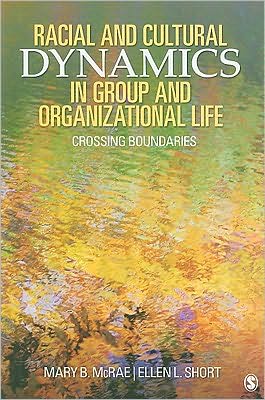

 |

|

The average rating for Racial and Cultural Dynamics in Group and Organizational Life: Crossing Boundaries based on 2 reviews is 4 stars.
Review # 1 was written on 2017-05-20 00:00:00 John Estrada John EstradaOhmystars. My dear theology professor wrote this book. I think it's just been published. He's a gem and if anyone is reading this, which I doubt they are, you should go buy a copy and read it! He is brilliant! And he loves Jesus.... |
Review # 2 was written on 2020-07-17 00:00:00 Jonny Martin Jonny MartinIf the theological academy as we have known it is under deadly threat, Kameron Carter's Race is an argument for its survival. Only those historically unusual conditions could have produced this tremendous work. Its writing and reading requires training in multiple, specific humanistic disciplines: I might list history, philosophy, critical theory, and the study of religion, in addition to systematic and historical theology. Apart from the academy, this book would be incomprehensible and probably indefensible. Within the academy, it preaches the gospel, in a new and necessary form. Carter binds many disparate arguments together between these covers'no one would mistake this for something other than a much-revised dissertation, built from separate chapters. Yet a single argument animates all of them, specifically, a claim that only theology can successfully narrate the history and present of race. Only theology, and specifically only the Christian gospel, can remove this category from our thinking, just as only God can save us from racism. For Carter, working from a high theology, the doctrine of the Trinity is the grounding for all Christian speech and the standard of human truth. Within the Trinity, difference is revealed as a legitimate category, as a condition of God's own being, as the aspect of God's own being made concrete or actual in creation. Understood in light of this revelation, differences among humans become a road into the life of the Trinity, an aspect of human beings' growing fully into the image and likeness of God, living out our destiny'for Carter, as for the African Orthodox like Athanasius, a destiny called divinization. "Modern logics of race foreclose" that possibility by any number of means, played out across the humanistic disciplines that have adopted the category of race, theology among them. By returning to theology, and indeed to the Christian God who is revealed in and lived into through difference, we can imagine something new, something rooted not in purity but in what Carter later calls "the miscegenized or mulattic existence of divinization" (192). The weaknesses of this book are standard for an academic text. Carter is far too harsh on his predecessors and on scholars outside his own discipline-- and I say that as someone who works in his discipline and agrees with essentially all of his premises and method. Nonspecialists will probably find it impenetrable. Those whose time and background let them read this book at all, however, will find it hugely rewarding. |
CAN'T FIND WHAT YOU'RE LOOKING FOR? CLICK HERE!!!